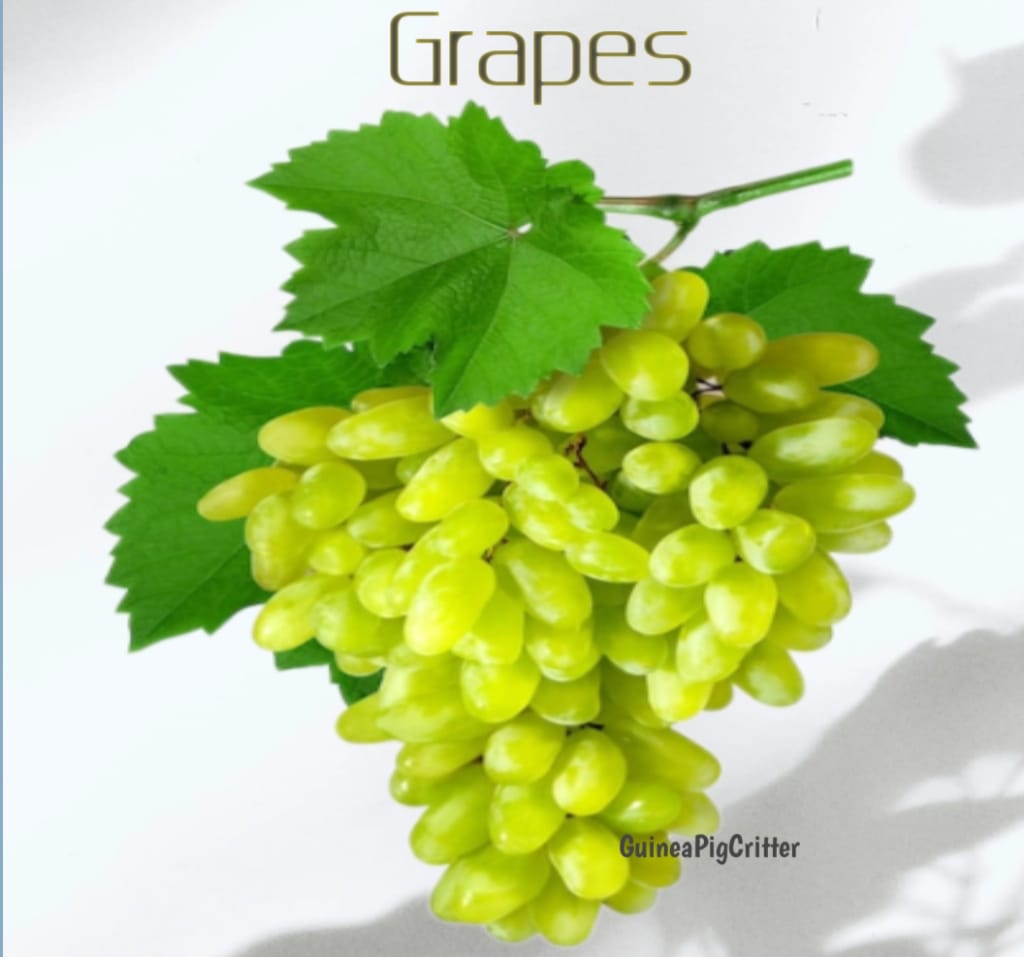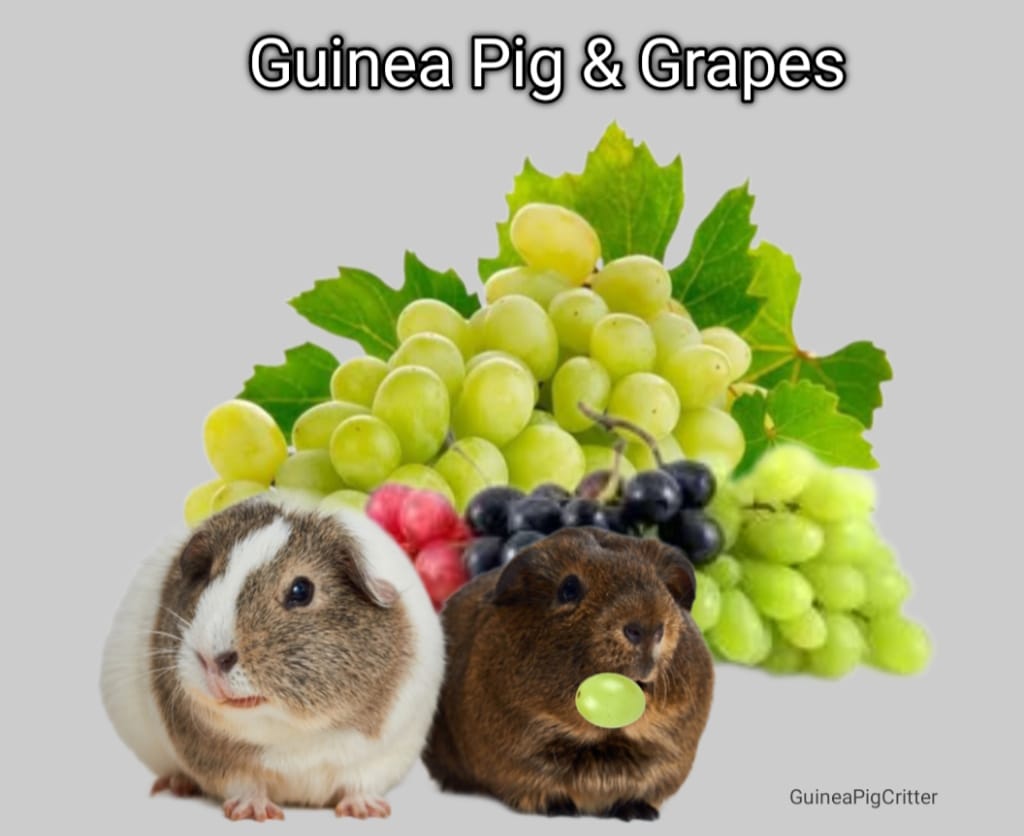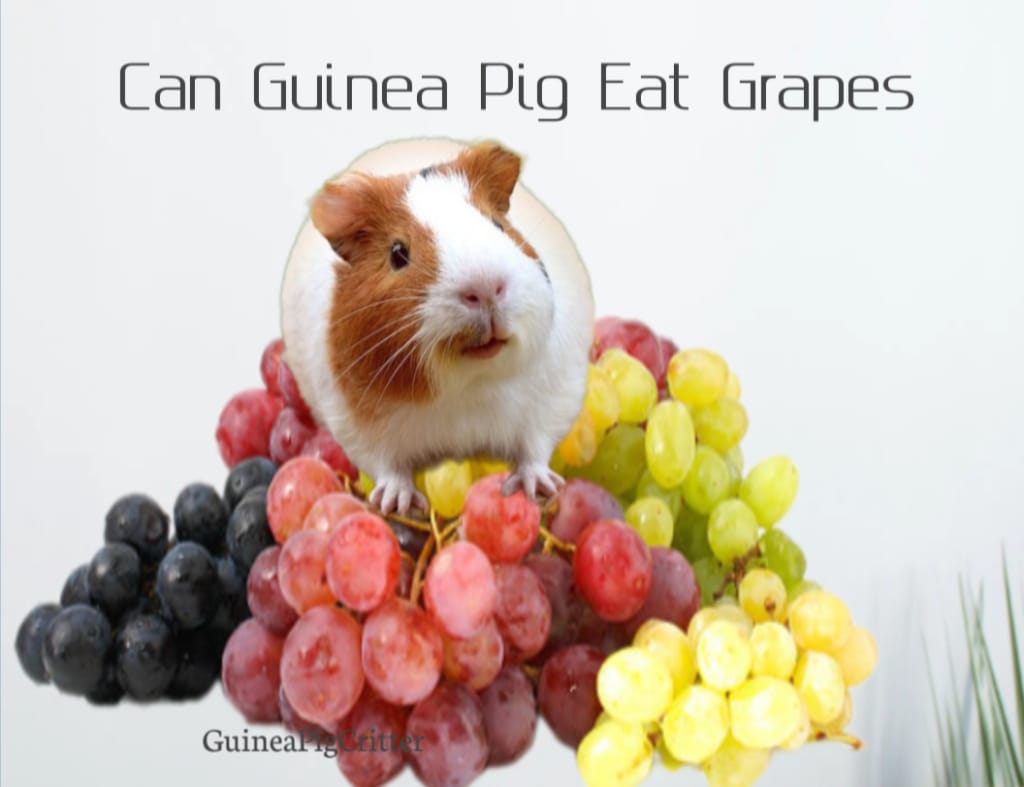Guinea pigs are also known as cavies and are popular pets because they are friendly and very sociable. So, it is vital to give them good nutrition, which means a balanced diet that contains lots of hay, fresh vegetables and just a few pellets. In terms of fruits people often wonder what fruits can be safe for them. Grape is one such fruit.
So, Today’s Question: – can guinea pigs eat grapes?
Yes, but there are important things to consider so that their health does not suffer. This all-inclusive guide will discuss the advantages, disadvantages and rules of feeding guinea pigs with grapes so that you have all the information you need in order to make informed decisions about the diet of your pet.
Nutritional requirements for guinea pigs
Before getting into grape specifics it is important to understand guinea pig nutritional needs generally. These small rodents require diets high in fiber, vitamins (especially Vitamin C), minerals mainly from hay, fresh vegetables and some pellet feed on the side. Fruits should only be occasionally provided since they contain high levels of sugar.
Guinea Pigs Essential Nutrients
Fiber: The diet of a guinea pig should mainly consist of hay. This will provide the necessary fiber that aids in digestion and also prevents dental problems by naturally abrading their continuously growing teeth.
Vitamin C: Guinea pigs cannot manufacture their own vitamin C so it is an important part of their diet. A deficiency can lead to scurvy whose symptoms are lethargy, swollen joints and dental problems
Fresh Vegetables: For essential vitamins and minerals, vegetables like bell peppers, kale, and parsley may be given. Leafy greens are particularly important for their overall health
Pellets: Their diets are sometimes supplemented with the inclusion of a few high quality guinea pig pellets that contain a well balanced mix of nutrients as required.
Water: They should always have fresh clean water available to maintain hydration and for general health purposes.
Read this post :-Can Guinea Pigs Eat Cilantro?
The Nutritional Benefits of Grapes
However, grapes should be seen more as treats rather than vitally important food elements in any cavy’s diet.
Vitamins and Minerals
Grapes contain some key vitamins and minerals including;
Vitamin C: As stated before, this is very vital to them. Therefore, having some Vitamin C contained on the grapes can boost their immune system as well as enhance their general health.
Vitamin K: This vitamin plays a role in blood clotting and bone health.
Potassium: It helps regulate fluid balance, muscle contractions and nerve signals.
Antioxidants: Grapes contain high levels of antioxidants such as flavonoids, tannins, and resveratrol. These substances help fight oxidative stress in the body which can reduce the risk of chronic diseases and improve overall health.

Hydration
Grapes have high water content that can be used to hydrate guinea pigs when they have nothing else to eat. They must always be well hydrated for their general well-being and proper functioning of urinary system.
Fiber
Though not as fibrous as hay or vegetables are, grapes still contain fiber which supports digestion and healthy gut.
Risks of Feeding Grapes to Guinea Pigs
While beneficial for some nutrients, there are also dangers associated with feeding grapes to guinea pigs which could easily cause problems if care is not taken.
High Sugar Content
The main concern about feeding guinea pigs grapes is their sweetness. Overindulgence on sugary fruits like grapes may result into weight gain, teeth issues, metabolic problems these animals suffer from already due to obesity as well diabetics.
Digestive Problems
In case given in large quantities, grapes can cause digestive problems. Due to their high water and sugar content, diarrhea and stomach upsets may occur. Accordingly, always watch the reaction of your guinea pig towards grapes as it will guide you on the appropriate portion size.
Threat of Choking
Grapes can be a choking hazard to guinea pigs especially when not cut into small pieces. To ensure that the pigs don’t choke while eating grapes, divide them into little sizes and remove any seeds they may contain.
Potential Allergies
Some guinea pigs rare though have been known to react allergic to grapes. Always allow your new pets some time so that they get used to the food that you offer to them bit by bit hence this will prevent their bodies from changing hence leading to these allergies such as skin itching or swelling or even respiratory failure in general.
Feeding Grapes to Guinea Pigs: Safety Measures
Here is how you should safely feed a guinea pig with grapes:
Thoroughly Rinse Them Off
To get rid of pesticides and chemicals plus dirt on them, it is important that one washes the skins of grape fruits thoroughly before feeding them. In fact, for safety reasons go for organic grape fruits since they are less likely going to have been sprayed with harmful substances such as insecticides upon ripening.
Feed Sparingly
When it comes to giving grapes as foodstuff don’t do it in excess because moderation is key for this matter whereby once or twice a week give two tiny bits only which will make sure that your pet enjoys itself without much sugar being taken also.
Cut into Small Pieces
To avoid choking, cut the grapes into little pieces that an animal can swallow without much difficulty. This also makes it easier for the guinea pig to consume and digest the fruit.
Remove Seeds
Take out the seeds from any grapes you wish to give your pet. Guinea pigs may choke on grape seeds and they might contain substances that are toxic to them.
Monitor Your Guinea Pig
Study your guinea pig’s response to grapes carefully, especially during initial attempts at introducing it to these fruits. Upset digestion or allergy signs should not be assumed. Should any adverse effects being noticed in a given guinea pig involving a veterinarian is recommended?
Balance with Other Foods
Do not make drinking water itself mainly of grapefruit juice. Hay should always form the bulk of their food, supplemented by fresh vegetables and a small number of pellets. In addition, other suitable fruits like apples, strawberries as well as blackberries may sometimes be included for change.
How to Introduce Grapes to Your Guinea Pig’s Diet
When giving new foods to your guinea pig, do it slowly so that you will not have problems with its digestive system and gradually let him get used to this kind of delicacy.
Start with a small piece
Begin by giving your guinea pig a tiny piece of grape the size of a raisin. This will help them to sample it and see if they can digest it.
Observe Their Reaction
After giving the little grape, watch your guinea pig so that you can tell if they have any digestive problems or allergies. These may be diarrhea, stomach upset, itching or breathing difficulties.
Gradually Increase the Amount
If the guinea-pig likes eating grapes and does not show any negative effects you should continue increasing this amount gradually over time. Nevertheless, even as you do so always keep portion sizes small and only give them grapes occasionally.
Maintain a Balanced Diet
Do not use grapes instead of essential components for your guinea pig’s diet. Hay, fresh vegetables and few pellets should make up their diet mainstay at all times.

Alternatives to Grapes for Guinea Pigs
While grapes are an enjoyable delicacy, providing other fruits and vegetables to your pet is beneficial as these will provide them with different nutrients that are important in their growth process. Here are other safe and nutritious fruits for guinea pigs:
Apples
Toxic guinea pig food should not have apple cores, seeds and skin. Guinea pigs’ systems cannot break down cyanide which is found in apple seed making it poisonous.
Strawberries
Strawberries with antioxidants are suitable for feeding to a cavy. Chop them into small pieces and give them some time when you can.
Blueberries
They also contain antioxidants and vitamin C like a grape it needs to be given only in moderation because of its high sugar content.
Bananas
In addition, they offer fiber and potassium. These fruits are also high in sugar so avoid giving large pieces all the time.
Pears
Guinea pigs’ system has no ability to synthesize ascorbic acid hence they need Vitamin C rich foods such as pears. Take out the seeds and core before serving your guinea pig.
Read also :- Can a Guinea Pig Drink Apple Juice?
Frequently Asked Questions (FAQs)
Are grapes safe for guinea pigs?
Yes, grapes are safe for guinea pigs but they should only be offered occasionally due to their high sugar content, not more than once or twice a week.
Are green grapes better than red grapes for guinea pigs?
Both green and red grapes can be given to guinea pigs and the difference is not great in terms of their nutritional content. It should be time and moderation on this issue; you must properly wash the grapes before giving it.
Can guinea pigs eat grape leaves?
Grape leaves are generally safe for guinea pigs, although they should only be given in small quantities. They provide an additional amount of fiber and nutrients but still have to be used as a treat occasionally.
What should I do if my guinea pig overeats grapes?
Should your guinea pig consume too much grape’s fruit or show signs of digestive upset, say diarrhea, just take away the fruit from them diet and keep enough amount of hay and water. Observe how they are doing and ask a veterinary doctor in case it remain.
Can baby guinea pigs eat grapes?
These pets’ digestive systems are more sensitive compared to that of adults’. You might want to hold off giving them fruits such as grapes until they reach three months old at least; also, give them in very minimal amounts.
Conclusion
Adding grapes to the diet of your pet guinea pig can be a lovely method of giving them the difference they need and extra nutrients. Nevertheless, this should be done cautiously and in moderation while considering possible dangers involved. Always rinse well the grapes, dice into tiny bits and watch out for any adverse reactions from your cavy.
If you supplement their main nutrition of hay, fresh greens plus pellets with snacks such as grapes then guarantee that your cavy is kept healthy, joyful and well fed. Do not forget that variation, proportionality and forbearance are key in a guinea pig’s diet that can keep it fit.


